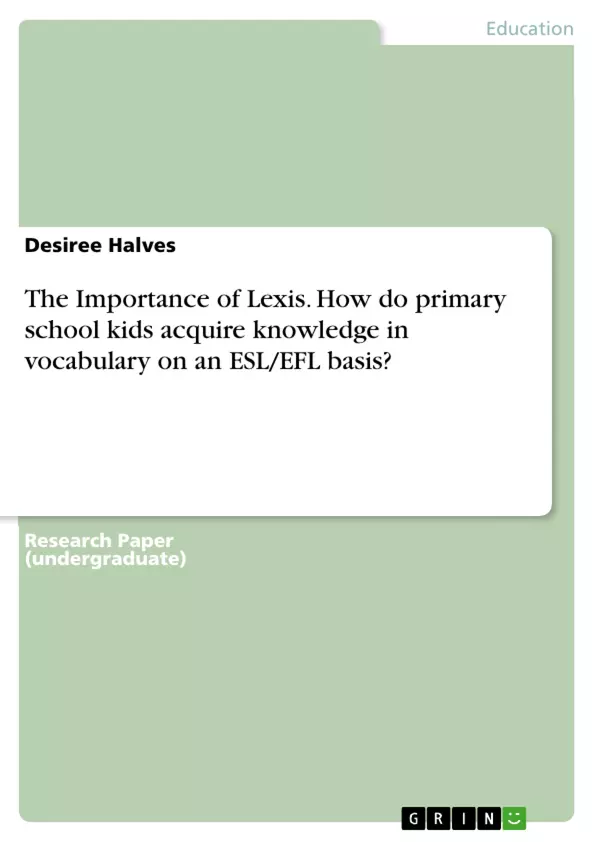How do young children make meaning of new words and in which way is new vocabulary taught to students? What are the most guiding principles concerning vocabulary acquisition? Also, which didactic strategies are best suited to teach vocabulary? In order to find out the answers to these questions, this paper investigates how primary school kids acquire knowledge in lexis within the framework of the VBS II, an internship, in which students participate. For this reason, I will analyze the value of teaching lexis based on Scott Thornbury´s book “How to teach vocabulary”.
Acquiring knowledge in lexis is a vital component in the process of learning a second or a foreign language. Lexis and grammar form the fundamental basis of the four language skills; speaking, listening, reading and writing. Those four give a person the ability to master a different language apart from one´s mother tongue, for instance, the English language. Nowadays, English, as the lingua franca, is basically taught to students on a global level. For this reason, it is crucial for students to develop a certain set of skills, oftentimes already at a young age, that helps them come to terms with contemporary expectations raised by the society and the global market.
In connection to these established expectations in society, teachers from around the world try their best to teach their ESL/ EFL (English as second or foreign language) students the necessary basics of the English language, which gives them the ability to communicate with people form different countries or to even act in the international world of business later in life. Depending on the country and its curricula, from kindergartners and first up to forth grade students are already introduced to the English language. Teaching young children therefore requires special methods, which need to fit the age of the pupils.
Inhaltsverzeichnis (Table of Contents)
- Introduction
- The value of teaching lexis
- The process of learning new vocabulary
- Three principles for teaching vocabulary
- VBS II - Analysis of an English class with 3rd grade pupils
- Lesson plan
- Analysis of teaching strategies and procedures
- Teaching material/ used objects
- Student reactions and possible occurring difficulties in class
- Conclusion
Zielsetzung und Themenschwerpunkte (Objectives and Key Themes)
This research paper aims to explore the significance of teaching vocabulary within the context of English as a Second Language (ESL) or English as a Foreign Language (EFL) for primary school children. The study investigates how young learners acquire new vocabulary, examines effective teaching principles and strategies, and analyzes the implementation of these principles in a real-world classroom setting.
- The importance of lexis in language learning
- Effective methods for teaching vocabulary to young learners
- Analysis of a specific English lesson plan
- Student reactions and challenges in acquiring new vocabulary
- The role of the teacher in facilitating vocabulary acquisition
Zusammenfassung der Kapitel (Chapter Summaries)
The introduction sets the stage for the research by highlighting the crucial role of vocabulary acquisition in the process of learning a foreign language. It introduces the VBS II internship program and outlines the research questions that will be addressed throughout the paper.
Chapter 2 delves into the concept of lexis and its significance in foreign language teaching. It explores the process of learning new vocabulary, emphasizing the importance of understanding both the form and meaning of words. Chapter 2 also discusses three key principles for effective vocabulary instruction.
Chapter 3 provides a detailed analysis of an English lesson conducted with 3rd grade students within the framework of the VBS II internship. It covers the lesson plan, teaching strategies, used materials, student reactions, and potential challenges encountered during the lesson.
Schlüsselwörter (Keywords)
Key terms and concepts explored in this research include lexis, vocabulary acquisition, ESL/EFL, teaching strategies, lesson planning, primary school children, student reactions, and the VBS II internship program. The research focuses on understanding how young learners acquire new vocabulary and identifies effective teaching principles and strategies for promoting vocabulary development.
- Citar trabajo
- Desiree Halves (Autor), 2018, The Importance of Lexis. How do primary school kids acquire knowledge in vocabulary on an ESL/EFL basis?, Múnich, GRIN Verlag, https://www.grin.com/document/511512



